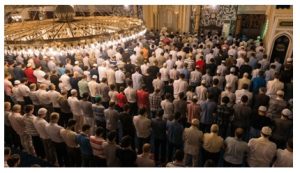Letters to the Editor
Q: How authentic is Shab-e-Barat celebration? Could you throw some light on the same with references from hadith?
YMD
Any celebration on the night of 15th Sha`ban is a non-religious act. There is no hadith to the effect that the night of 15th of Sha`ban may be celebrated. In fact, celebration should be specifically avoided because – as Ibn Is-haq and others have reported – the Prophet’s teeth were broken, his followers met with their defeat, Hamza (ra) was martyred, and 70 Companions lost their lives on the 15th of Sha`ban at Uhud. For the inhabitants of Madinah it was a day of mourning and Allah (swt) revealed verses to console them.
As regards visiting the graveyard in the middle of the night, and fasting the next day, there seems to be no consensus of opinion over its legality or illegality. There are several ahadith that refer to it. They are all weak. But there being several of them lends the reported substance some value. But of course, none of the reports suggests lighting up of mosques, special communal prayers, speeches over half the night, distribution of sweets, and so on.
Any communal activity on that night will border with bid`ah: an act of outright rejection. At best, if an individual visits the graveyard, spends the night in Prayers, and fasts the next day, (all at individual level), with full knowledge that it might have religious sanction, or might not, but it is being hoped that Allah (swt) will accept the Prayers and fast as ‘nawaafil,’ then, the matter rests there: on good hope.
But attempting these things at the communal level, even on “good hope,” is not justified because of the absence of religious sanction. Therefore, if attempted at the community level, as a religious requirement, it could be “bid`ah” while doing those things with celebratory overtones, will carry a hidden insult to the historic events at Uhud.
 Q: How does a person know whether his repentance has been accepted or not?
Q: How does a person know whether his repentance has been accepted or not?
YMD
There are two apparent and two unapparent signs. If a repentant stops doing what he repented, and finds himself doing better things in place, his repentance might have been accepted.
The two unapparent signs are that he carries a feeling of remorse over the sin he committed (never a feeling of joy over it) and, two, offers great resistance to the sin when another opportunity appears.
Q: And for how long should a person repent if he commits a sin?
YMD
The ritual repentance is only once.
However, ‘istighfar’ should be as often as possible during the day and night. The Prophet said that he does ‘istighfar’ seventy times a day. This ‘istighfar’ has the overtones of regret over what was not done of the good things, but which could have been done; and seeking closeness to Allah (swt) by reminding oneself of one’s own weakness, and Allah’s greatness.
Farheen Maniyar,
On Email
Q: I am a regular reader of your esteemed journal and would like to congratulate you for all the good work you have been doing since all these years. My first question is regarding the effects of the two eclipses, i.e. lunar eclipse and solar eclipse on our lives, does it have any good or bad effect if a person sees it directly or on television, and if there is any hadith in this regard.
YMD
Any cosmological happening is bound to have some effect on the earth and earthlings. For example, a star in the vicinity of our Solar system collapses and bursts. Its parts fly into space and can one day a few fragments land on the earth, even if it takes millions of years, and even if it is in the form of cosmic dust. Once it is part of the earth, it comes into the life-cycle and will one day enter into our body  through the food chain. This is a scientific fact. It is estimated that 30-40,000 tons of cosmic dust fall on to the earth every year.
through the food chain. This is a scientific fact. It is estimated that 30-40,000 tons of cosmic dust fall on to the earth every year.
But to believe that the heavenly bodies have some effect on the fate and destiny of individuals on the earth is an idea that comes from pagans of the past. Arab pagans believed that Sun and Lunar eclipses are signs of important happenings on the earth. Some pagan tribes believed that the Sun or Moon under eclipse were being attacked by the Devil. Accordingly, they beat drums to drive the Devil away.
The Prophet refuted all such notions and said that they were mere signs of Allah (swt). He instituted special Prayers on that occasion, and Muslims of today will do well to establish the Prayers.
Although, instead of watching the phenomenon (which in reality does not evoke any wonder, since the clouds do the same thing the year around), the Muslims should be Praying, yet, there is no harm in watching the event either directly or on TV. However, watching Sun eclipse without special glasses can lead to blindness.
Q: And my second question is regarding the practice of reciting the Surahs or Durood for any specific number of times, which is advised by the people on TV, and which is being followed by a number of people who claim to have solved their problems and got positive results.
YMD
There are ahadith that speak of the virtues of a few chapters of the Qur’an, or of few verses. But they are in general terms. There is no trustworthy hadith with reference to resolving any specific human problem with the help of this or that ayah or supplicatory words.
As regards ‘durood,’ it should never be said but out of love of the Prophet.
In general, we can say that the recommendations, either made on the TV or in person, or in a book, have no Islamic sanction.
 Those who offer them would do better to offer these formulas on their own authority or past experience, rather than use the name of Islam.
Those who offer them would do better to offer these formulas on their own authority or past experience, rather than use the name of Islam.
The Qur’an is here to discipline our lives and lead us to salvation in the Hereafter, and not to solve, through mere recitation, socio-economic problems.
Those who resort to Qur’anic recitation, when faced with a difficulty, while ignoring its study, have no share in the blessings of this Book.
As regards people obtaining positive results through a suggested formula, Qur’anic or otherwise, many such results can be attributed to coincidence. In a few cases, it could be that Allah (swt) granted them their desire (regardless of what of the formulas they read) to put them to test: whether they will turn good Muslims or carry on leading the life of the corrupt. Thus, positive results are no sign of the practice being correct.
A person who goes to a doctor when he faces a medical problem, is better guided than he who resorts, as the first thing, to a religious formula-recitation. This is, when there are medical problems. But if the problems are of economic or social nature, then, resorting to formula recitation (whether at the start of the problem, or as the final resort) instead of turning to Allah (swt) in repentance, and re-shaping one’s life and habits according to Islamic principles, is being closer to paganism than to Islam.
Rumana Zainab,
On Email
Q: I am a government employee. It is a general practice to take, e.g., housing loan for tax exemption. Is that allowable? Another question is, if someone takes a housing loan, and the loan takes 20 years to be paid back, then can he or she perform during this period of time?
YMD
You did not mention whether the said loan is interest-based. If it is, you cannot take it.
Either way, one’s Hajj is not affected by the loan.
Sajid Khan Guari,
On Email
Q: I need explanation regarding Taraweeh: whether I have to perform eight or twenty Raka’ats. Brothers who are performing eight as well as twenty Raka’ats are saying that they are right. Explain to me whether eight is right or twenty is right, or whether both are right. Eight Raka’ats performers say that Nabi (saws) performed only eight, not twenty, while twenty Raka’atsperformer’s say that Umar (ra) instituted it because of some reasons. Please explain in a clear way.
Mohammad Ali,
On Email
YMD
It is not good to differ with the general community of Muslims. If they do eight rak`ahin your neighborhood mosque, you should do eight. (If you want to add, do it at home). If they do 20, you do 20 in the mosque.
Taraweeh Prayers are Nawaafil, and, therefore, not bound with any number. Many of the Salaf prayed long hours at home at night, with no binding of the number of rak`ah.
 Today, some Muslims raise slogans in the name of the Salaf, but hardly care for what they used to do. Many Muslims seem to prefer the number eight because for them the Prayers are a burden. But one man’s burden should not be another’s burden too: it can be a pleasure.
Today, some Muslims raise slogans in the name of the Salaf, but hardly care for what they used to do. Many Muslims seem to prefer the number eight because for them the Prayers are a burden. But one man’s burden should not be another’s burden too: it can be a pleasure.
One may, therefore, perform as many Prayers as the local mosque does, but do more at home.
Q: I am a student. I am engaged to my cousin. So I wanted to ask you whether it is alright for me and my fiancée to talk before marriage. I want to know whether there are any limitations in Islam? Is it good if we talk for hours? Please reply soon.
Najia,
On Email
YMD
Generally speaking, talking for hours is not beneficial to anybody, unless it is between two intellectuals, who might be meeting with one another after a long gap of time, and have several issues to sort out. If you two belong to that category, you may talk to each other for hours. But give a few months gap between one talk and another.
As regards ordinary people we cannot see how they can talk for hours and not speak out things that, if remembered later, will be source of regret.
There is a period immediately after marriage, which is known as honeymoon. It is said to last a month, or less or more, depending upon the couple. But in truth there is no predictable period. For some it never ends. For others it never starts.
Among the Arabs, the saying goes that if a wife tells her husband when he arrives home that, “Your dinner is in the fridge,” the honeymoon is over. In the West, for many on the cruise ship carrying newly-weds on their two-week honeymoon ends with the boat docking at the court.
What sort of people experience the longest honeymoon? The answer is in negatives: not the educated people, not the rich people, not the city people, not the modern people. Not the chat people.
Who then? Well, guess who.
Ordinarily, the key to the length of honeymoon is in one word: exposure.
The more and faster the two of a pair expose themselves to each other: personally, physically, socially and intellectually, the faster their honeymoon ends.
Long talks expose the two to each other intellectually. If they already have had enough intellectual exposure of each other before marriage, one factor that prolongs the honeymoon is already gone. Very soon the two can be found at “minimum conversation level.”
 In short, there is a certain time-span of pleasant talk between a pair. Whether you will utilize that “given time” before marriage or after it, is your choice. The brides of yesteryears, when family quarrels and separations were as common as tulips on Mount Everest, were not as clever, nor as coquettish as their modern-day fast-talking, fast-moving, fast-eating counterparts. But they were a little more sagacious to maintain a tight lip, unless to smile.
In short, there is a certain time-span of pleasant talk between a pair. Whether you will utilize that “given time” before marriage or after it, is your choice. The brides of yesteryears, when family quarrels and separations were as common as tulips on Mount Everest, were not as clever, nor as coquettish as their modern-day fast-talking, fast-moving, fast-eating counterparts. But they were a little more sagacious to maintain a tight lip, unless to smile.
Some amount of risk also hides in pre-marital chats. One or both might be lured into saying what they truly do not believe in. For example, one of them says, “I don’t like the way the religious scholars portray Islam.” The other says, excitedly, “I hate them all.” (Although she doesn’t really hate them). But the other gets alarmed. (He has been into Tableegh once or twice). He asks, “What do you think of the tablighee people?” She answers (assuming that she is pleasing him), “I think they are the worst of the lot!”
The man starts wondering whether he can get along with such an extremist.
Or, “What do you think of ageing parents? It scares me to think of how one can manage to look after them.” She (not knowing what is in his mind), “I know what you mean. But, after all, nowadays there are quite a few old people’s homes around.” He receives a jolt. He had thought she might reply, “Don’t worry. Together we shall take care of our parents!”
It can be the other way round also. She says, “I have promised myself I shall serve my parents as they get old.” It casts cold water on his ideas. He asks himself: “Am I marrying a girl who promises to bring trouble with her right from the start?” He cools off a bit.
Or, he might say, “I like ice-cream.” She takes the cue to pipe in, “Me too.” And then adds up cheerfully, “I can eat ice cream even when it is snowing.”
(He tells himself, “My goodness! I hope I am not marrying a Siberian cat.”)
Warning: Sometimes long chats can lead an engaged couple to a situation where their cruise-ship sails without them.
Q: I am very much worried about my brother’s behavior! He is a person who has good character, good academic and Islamic knowledge. Even his intentions with every person are good and his appearance is also good. But his behavior changes towards me, my sister and my mother!
I am seventeen and my young sister is fourteen. When I was fourteen, his attitude was the rudest one and same is going on with my younger sister. He speaks very rude with my mother though she has loved him and cared him more than us. He speaks rubbish words to my mother and my sister!
We are very much worried as to why his behavior changes towards us! My mother has cared for him as a flower, and till now she cares him as if he is a nursery child though he speaks ill about her character! Can you help me by printing an article about mother’s and sister’s values? He is regular reader of Young Muslim Digest and advises others to read it!
Fatima S. T.,
On Email
YMD
At first thought, we believe these are vagaries of age. Teens are restless, energetic, and craving for physical action. When opportunities are not available, they are angry and disappointed, and, must spend their anger on someone. That someone can only be one who cannot, or will not, retaliate.
If he, or she, were to behave in the way you describe with say friends, they will fire back doubly power-packed salvos to wound him out of action for several days. This is especially the case with boys in their teens.
In many parts of the world, they form gangs and expend off their energies in fighting with each other. Realizing this, schools and colleges provide physical activities such as compulsory games, exercises and outings of treks, mountain climbing, etc. In some countries, they force them into military training.
In India, most avenues for expending youth energy are missing, and so, the youth must play the odd and noisy tune at home, especially where the father is not tough and strict. This is what we think is the case with your brother whom you describe as otherwise perfectly normal and well-behaved.
However, if the behavior persists over twenty years of age, then he might be referred to a psychiatrist/ psychologist to determine whether he suffers from bi-polar syndrome, obsessive-compulsive personality disorder, schizophrenia, borderline personality disorder, paranoid, or the like.

